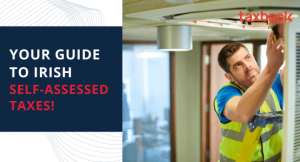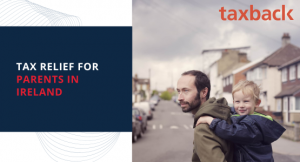Finance, tax and the move to a nursing home
This tax guide should come in handy if you or your loved one are moving to a nursing home!
There are a number of cost and tax implications to be considered when you or a loved one are moving to a nursing home. For starters, the costs associated with long term care in a nursing home can often be very substantial. It's not uncommon for nursing home fees to reach €1,000 per week (or €52,000 per annum).
And, as the Fair Deal Scheme and other government schemes often don't cover all of these costs, many fee payers will be keen to recoup as much of this money as possible. Fortunately, there are a number of tax measures in place which can help you to do this.
This useful guide is full of practical information about your tax refund entitlements and will help you to avail of any benefits or reliefs that you or your loved one are entitled to. It will also clear up some common tax obligation queries that arise when a loved one moves to a nursing home.
Nursing Home Expenses

If you are paying nursing home fees for yourself or a loved one, you can claim relief on nursing home expenses at your highest rate of tax under the below conditions:
• the nursing home provides 24 hour on-site nursing care
• the maintenance or treatment expenses incurred are in association with the services of a registered practitioner
• the expenses are for diagnostic procedures carried out on the advice of a registered practitioner
Relief During the Tax Year
In certain circumstances it is possible to claim relief on your nursing home expenses during the tax year. To find out if you are eligible, it is best to liaise directly with Revenue. If you do receive this relief, you will need to file a Form 12 tax return as normal at the end of the tax year.
Fair Deal Scheme

Many people avail of tax relief under the Fair Deal Scheme (or the Nursing Homes Support Scheme). Operated by the Health Service Executive (HSE), the scheme aims to provide financial support to people who need long-term nursing home care.
Under Fair Deal, you make a contribution towards the cost of the care and, if your accessed contribution is less than the amount of the fees, the HSE will pay the rest. While you can claim tax relief on the contribution you make, you can't claim any relief on the contribution made by the HSE.
For more information about the Fair Deal scheme, contact your local nursing home or the Fair Deal office directly.
Dependent Relative Tax Credit

If you're caring for a dependent relative you may qualify for the Dependent Relative Tax Credit.
You can claim this credit if you pay for the cost of maintaining:
• A relative (relatives of a spouse are eligible) who can't maintain themselves due to ill-health or old age
• Widowed or surviving civil partner parent of yourself or your spouse or civil partner, irrespective of health
• Your child or spouse's child who lives with you and on whom you depend as a result of old age or ill health
The value of the credit depends on:
- The cost of maintaining your dependent relative - the tax credit is the cost of maintenance up to €70 in 2019
- If the income of your dependent relative exceeds €15,060 in 2019, no tax credit is due (the income limit was €14,753 for 2018, €14,504 in 2017, €14,060 in 2016 and €13,904 in 2015). All of your dependent relative's income (for example, social welfare payments, pensions and deposit interest) is taken into account for this assessment
If you want to claim this credit you can contact Revenue or complete a DR1 form for a relative or parent or DR1 or DR2 for son or daughter. You should send the completed form to Revenue who will update your tax credits if you qualify. If you pay tax under the self-assessment system, you can claim the tax credit by completing the 'Dependent Relative' section on your annual tax return.
The average Irish tax refund is €1,880
Medical Expenses

If you pay for medical costs, either for yourself or a loved one, you can claim medical expenses at a rate of 20%.
Amongst the list of medical expenses you can claim are:
• Costs of doctors and consultants fees
• Items or treatments prescribed by a doctor or consultant
• Maintenance or treatment in a hospital or a nursing home
• Transport by ambulance
• Kidney patients' expenses (up to a maximum amount depending on whether the patient uses hospital dialysis, home dialysis or CAPD)
• Specialised dental treatment
• Drugs and medicines (prescribed by a doctor)
• Diagnostic procedures (prescribed by a doctor)
• Orthoptic or similar treatment
• Hearing aids
• Orthopaedic bed or chair
• Wheelchair or wheelchair lift (no relief is due for alteration to the building to facilitate a lift)
• Physiotherapy, chiropody/podiatry services or similar treatment
Note: you can't claim tax relief for sums already received (or due to be received) from a public or local authority (for example the HSE), an insurance policy and any other source, for example compensation.
When claiming medical expenses it is always very important to retain your receipts. In a situation where a nursing home pays medical expenses on behalf of a resident, and then include the cost on their invoice to the resident, the invoice will suffice as a receipt for the expense.
Kidney Patients
Kidney patients are entitled to a number of additional reliefs to the normal health expenses.
For example, you can claim relief on the cost of travelling to and from the hospital if you or your loved one travels regularly for dialysis treatment. If you're travelling in your own car you can claim relief at €0.29 per mile or €0.18 per km (2018).
Medical Appliances

You can claim relief on the cost of purchasing, maintaining, and repairing medical appliances for yourself or on behalf of a loved one (that you've been advised to use by a registered practitioner) including:
• glucometer machines
• hearing aids
• orthopaedic beds or chairs
• wheelchairs or wheelchair lifts
• exercise bicycles
• computers, if necessary to solve communication difficulties for a person with a severe disability
• false eyes
• wigs
However, the following appliances don't qualify:
• cars for a disabled person
• construction work to facilitate a person with an illness or disability
• telephone installation, line rental or call costs
Disposal of Assets

If you or your loved one are hoping to organise financial affairs before moving to a nursing home, there are a number of tax exemptions and reliefs that can be availed of before the move.
Capital Gains Tax
Capital Gains Tax (CGT) is a tax charged on profit made from the disposal (selling, gifting or exchanging) of an asset. CGT is due from the person making the disposal.
However, it is important to note that everyone is entitled to a personal exemption on the first €1270 (after deducting losses) of a capital gain or profit. This means you will not have to pay CGT on this amount.
There are also some additional circumstances (below) by which you can be exempt from CGT.
The average Irish tax refund is €1,880
Principal Private Residence (PPR)
Under Principal Private Residence Exemption (full or partial), you or your loved one can transfer or sell a property (for its development value), including land up to one acre around a house, and be exempt from Capital Gains Tax - as long as that property was their main residence while they owned it.
Transferring A Site From A Parent To A Child

No Capital Gains Tax (CGT) is due on any transfer of land from a parent to a child as long as:
• The child will use the land to build a house which will be their main residence
• The land is one acre or less
• The land has a value of €500,000 or less
The child may have to pay CGT on the disposal of the land transferred from a parent to them in two specific situations.
These are:
• where the child disposes of the land without having built a house
or
• if they have built a house on the land, having not occupied that house as their only or main residence (this must be for a period of at least three years)
Disposal of a Business or Farm

If your parent is in the 55-65 age bracket and wants to dispose of their farm to their child before they move to a nursing home, they can claim full relief from Capital Gains Tax (restricted to €3 million).
To qualify, the individual transferring the assets must have owned them for a minimum period of 10 years (ending with the date of disposal).
Note: If the child disposes of the asset within 6 years, Revenue can withdraw the relief.
For disposals made up to and including 31 December 2013, it's possible to claim full relief when the market value at the time of disposal does not exceed €750,000. The threshold is reduced to €500,000 if both of the following apply:
• the disposal takes place on or after 1 January 2014, and
• you are 66 or older
If the market value is more than the above defined threshold, marginal relief may apply (half the difference between the market value and the threshold). If the threshold is exceeded, Revenue can withdraw relief given on earlier disposals.
It is also possible to claim retirement relief on a disposal of shares in a family company. In this case you must hold at least 25% of the voting rights (or at least 10% of the voting rights, where together with your family, you have at least 75% of the voting rights). You must also have been a working director of the family company for not less than five years of the 10 year ownership period.
Relief can also be claimed on a disposal of land, plant and machinery which you have owned for at least 10 years as long as:
• The asset was used throughout the 10 year period by the family company
and
• It's disposed of at the same time and to the same person that bought the shares in the family company
Gift and Inheritance Tax

If your loved one intends to leave an inheritance to someone, they may have to pay
Gift and Inheritance Tax on it. However, they can use the Small Gift Exemption to give tax free gifts or inheritances of up to €3,000 to other family members or friends without any tax being due.
Dwelling-House Exemption

If your loved one disposes (as a gift or inheritance) of a house to you, the transfer can be exempt from Capital Acquisitions Tax under certain conditions.
Firstly, your loved one must have owned the house for at least three years prior to gifting it and you must not own or have an interest in any other house at the time you are gifted the asset.
The house must also have been your main residence for at least the three years immediately preceding the date of the gift or inheritance.
It's important to note that, in the case of gifts, time you have lived in the house will be discounted if it was your loved one's only or main residence. This is the case unless your loved one was dependent on your care because of old age or illness.
You must continue to occupy the house as your main residence for the following six years (this condition does not apply if you are over 55 years at the time of receiving the benefit).
Taxback.com

Moving to a nursing home and confused about your tax obligations?
Taxback.com can help you! Our ISO 9001 certified team of tax experts can answer any tax questions you have, help you file fully compliant returns and ensure you claim back any overpaid tax, guaranteeing peace of mind and more money in your pocket!
Want to learn more? Simply fill in the short form below to download the Taxback.com & NHI Guide to Claiming Tax Back from Nursing Home Expenses.
The average Irish tax refund is €1,880




